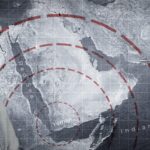
By Khalil Harb – Nov 22, 2023
The aging Palestinian leader faces his worst nightmare: His Israeli partners massacring Palestinians in Gaza, a possible Third Intifada in the West Bank, and widespread popular support for armed resistance against his benefactors. The threats could be existential for the PA.
The overlooked casualty of Israel’s Gaza genocide is its West Bank Palestinian partner – the Palestinian Authority (PA) – now teetering on the brink of crisis as its ailing President Mahmoud Abbas confronts three formidable threats.
Whether it’s absorbing the fallout from the occupation state’s aggression, contending with a potential “third intifada,” or grappling with the consequences of an inevitable Israeli defeat in the war, the PA finds itself in a no-win situation. The danger may be existential for the PA, which for years has been described as Israel’s enforcement arm in the occupied West Bank.
The widely unpopular PA was already in a state of total inertia before the Al-Aqsa Flood resistance operation unfolded on 7 October. The unelected 88-year old Abbas, whose 18-year term has been extended at the whim of Americans and Israelis, has long been detached from Palestinian realities. Moreover, he has been singularly unable to put forth a vision to address or resolve the mounting crises affecting over 3 million residents in the West Bank, 60 percent of whom are under the age of 30.
Abbas’s tenuous relationship with the occupation state, characterized by financial manipulation, has reduced the PA to a “client state” dependent on its oppressor. Simultaneously, Abbas and his Fatah party face a significant decline in popularity, ceding ground to growing support for Hamas and other Palestinian resistance groups.
Corruption, collaboration scandals, and a poor human rights record further tarnish its image. And the security arrangements of the ill-fated Oslo Accords no longer offer a shield for the PA since they lost control of Gaza 17 years ago when Hamas won a landslide victory in the 2006 elections.
PA’s struggle for survival
The PA was established in 1994 based on the first Oslo Accords (1993) between the Israeli government and the Palestine Liberation Organization (PLO). It was initially established as a temporary governing body that would lay the foundation for an independent Palestinian state.
Among the stipulations of the Oslo Accords is the PLO’s recognition of Israel’s authority over 78 percent of the lands of historic Palestine, with the exception of the West Bank and Gaza Strip. It further stipulated that Israel completely withdraw from these territories within five years of signing the agreement. This, of course, did not materialize.
Now, Al-Aqsa Flood may deliver a mortal blow to the PA, which has failed to leverage its security ties with Israel to halt the Gaza assault – if, in fact, it ever had any clout with its occupiers. Nor did it intervene after the West Bank erupted in May 2021 over Israeli violations in Jerusalem, which led to the Sayf Al-Quds battle and the Unity of Fronts equation.
Since then, the PA has assiduously neglected the sharp spike in popular discontent in the West Bank. As the security situation worsens, Abbas and Co. have proved ineffective in coordinating security measures to curb violent attacks by illegal Jewish settlers and the now-daily Israeli military incursions into the West Bank’s cities, villages, and refugee camps – and even stand accused of collaborating with the enemy. The West Bank has witnessed over 400 Palestinian deaths so far this year, 200 of these since 7 October alone.
Israeli Prime Minister Benjamin Netanyahu’s reluctance to repeat Gaza’s experience under PA rule hints at potential shifts. He proposes a mixed authority for Gaza, involving local Palestinian figures and international roles, which would fundamentally undermine the Oslo Accords and the envisioned “Palestinian state.”
If Netanyahu were hypothetically to succeed in neutralizing Hamas and other Gaza-based resistance factions, he would likely extend the military actions to the West Bank, into the remaining areas ostensibly under the control of the PA. This adds weight to Abbas’s shoulders, as it has the potential to set off a large-scale intifada, a concern shared by Israel’s security and military institutions.
The Other War: Why Israel is Desperate to Crush Resistance in The West Bank
The economic crisis, political impasse, and Gaza war have exacerbated the already volatile conditions in the West Bank. Israel’s actions, whether it manages to facilitate the collapse of the Ramallah authority indirectly or salvage it by throwing financial sweeteners at the problem, are aimed at maintaining the same “client state,” albeit with new faces.
External financial support to the Palestinian Authority witnessed a significant decline from $1.2 billion in 2008 to about a quarter of this amount in 2022. Arab support either faltered or came with increasingly limiting conditions, depending on the position of the Arab donor state toward Israel and the Authority itself.
In response to the PA aiding families of martyrs and detainees, Israel deducted additional funds, totaling approximately two billion shekels ($202 million) between 2019 and 2022. On 15 September, Palestinian Finance Minister Shukri Bishara estimated the amount of funds withheld for three years at $800 million.
Challenges to Abu Mazen’s leadership
In light of these conditions, the results of a 2021 opinion poll conducted by the Palestinian Center for Policy and Survey Research in cooperation with the Konrad Adenauer Foundation were unsurprising.
It revealed that 78 percent of Palestinians want Abbas to step down from power, and that if presidential elections were held then, 58 percent would vote for Hamas Political Bureau Head Ismail Haniyeh, compared to a paltry 37 percent for Abbas.
There had been noteworthy political developments in the Palestinian community prior to the poll: these included the killing of influential political activist Nizar Banat following his arrest and severe beating by PA security services, the eruption of widespread demonstrations against the PA demanding justice for Banat, and the daring escape of six Palestinian prisoners from Israel’s high-security Gilboa prison.
But it is clear that “Abu Mazen” has lost the ability to actually rule – anywhere. The increased Israeli military operations in the West Bank; the blind violence used to chase down Palestinian resistance fighters and destroy their family homes; the arrest of thousands of Palestinian men, women, and children; the mass confiscation of Palestinians lands to erect further illegal Jewish settlements – these Israeli violations only intensify anger against Abbas and his coterie.
Yet in a stunning display of cognitive dissonance, Abbas is now attempting to position himself as Gaza’s alternative to Hamas, a group he has long disavowed.
On 10 November, Abbas said the PA was ready to assume “full responsibility” for the Gaza Strip as part of a comprehensive political solution. His offer followed Egypt’s rejection of the US administration’s proposal to administer the Gaza Strip after the end of the war, and was leaked after a meeting with US Secretary of State Anthony Blinken.
Agents of annexation
It is interesting to note that a week after Al-Aqsa Flood, the Palestinian News Agency quoted Abbas as telling Venezuelan President Nicolas Maduro that Hamas’ policies and actions “do not represent the Palestinian people.”
Reuters said it was later deleted from the Palestinian media outlet’s website before being modified to say that only the PLO is “the sole legitimate representative of the Palestinian people, and not the policies of any other organization.”
Even if Abbas manages to avoid the direct impact of the Gaza war, public discontent, and Israeli constraints, he would be left to confront an equally significant challenge in determining how to address the Gaza Strip. According to Israeli newspaper Yedioth Ahronoth, there are additional phases that may occur in reaching a lasting settlement for Gaza that could span several months.
In this scenario, the PA would assume civilian control over the Gaza Strip, while the Shin Bet and the Israeli army would operate freely in intelligence efforts, similar to the arrangement in Area B of the West Bank.
By accepting this treacherous proposal, Abbas appears prepared to align with Tel Aviv’s plan to reassume complete security control over Gaza. This will be nothing new for him – it mirrors precisely the West Bank’s state of affairs, where occupation forces operate under the vigilant oversight of Palestinian security services.

Khalil Harb
Khalil Harb is a Beirut-based journalist and former editor-in-chief of the Lebanese daily Al-Safir. He has also worked for the Associated Press and the Lebanese An-Nahar newspaper. Khalil is a graduate of the American University in Cairo.
- March 25, 2024




